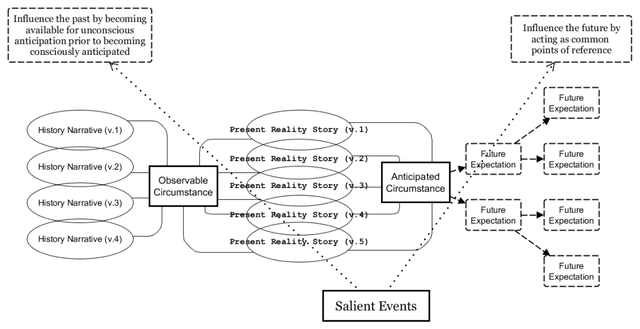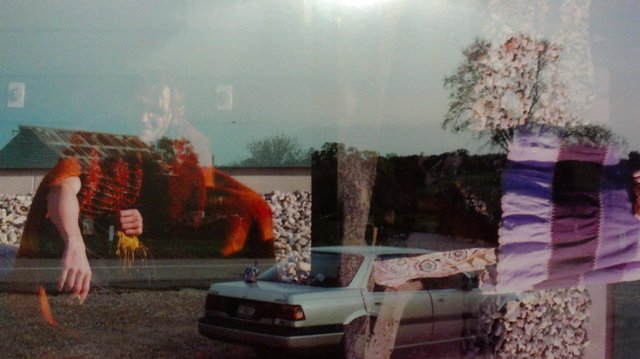Philosophical reflections on being hit by a cop car as a kid and growing up alongside the world wide web

There are few secrets in a small town.
My mom subtly explained this when I arrived home one afternoon at age 13.
"Bruce the barber called," she informed me. "He said he saw you smoking cigarettes behind the dentist's office."
The broader implications of having everybody know your business did not really begin to sink in until the following summer while I was skateboarding in our town's single paved alley.
A police car entered the alley and did not drive past. Instead, the vehicle swerved to hit me, and I found myself on the sweltering hot hood of a car with a pissed off peace officer looking at me through the windshield.
"I KNOW you got caught smoking marijuana in the state park," said the small town public servant that had just intentionally hit me. "Did you think I wouldn't find out? You're in a lot of trouble!"
Peeling myself off the car's hood, I limped to her open driver's side window to better receive this scolding. My skateboard was rolling away.
"I know. It was stupid. I'm sorry," I admitted to this cop that had taught drug abuse resistance education to my fifth grade glass a few years prior.
It did not seem at all wise to point out that hitting a 14 year old kid with a car was way worse than smoking weed in the park.
Nor did it seem prudent to mention that the park ranger who had caught me in the act of getting stoned also lectured me thoroughly on the dangers of marijuana while driving me out to the middle of nowhere so I could "think about what I had done" on a several-mile-walk back to town.
So I just stood there and feigned attentiveness so as to prevent this well-intentioned maniac-with-a-badge from feeling like she needed to further physically accost me to make her point.
Obviously I learned my lesson.
The lesson that I learned was that people who saw things differently than I did would sometimes cause trouble for me if they knew my business.
I've since noticed that the visceral here-and-now of experiential REAL rests upon the stories we tell ourselves and each other about ourselves and each other in a given moment. And people tell all kinds of stories. So, given the incredible diversity that exists among people, I have come to see reality itself as pluralistic.

We live alongside one another, but do not necessarily inhabit the same world.

(pic of me on peculiar double-exposed photo)
As it happens, this pluralistic nature of reality has become much easier to see from the comfort of our own homes in recent years. The ubiquity of technologies that radicalize transparency have seen to that. It has consequently become very easy to pay attention to people who do not see the world in the same way that you do at all. And, having been born in 1981, I've been watching this technologically-mediated radicalization of transparency mutate out society since I was old enough to start paying attention to such things. Which makes me wonder:
What does it mean to be part of the generation which came of age alongside the world wide web?
This generation bridged the gap between prior generations and so called 'digital natives.' It beta tested postindustrial culture. And we have been called all sorts of names.
First, we were late genX, then it was early genY, now we are apparently 'millennials'. These labels are mostly employed to describe variables in a formula that demographically types us for marketing and other consumer-identity-related purposes. Whatever.
I call us accidentally the generation, because our forbears probably didn't break the world on purpose.
“I Accidentally is a catchphrase. . . that exploits the imagination of English speaking internet users. By constructing a complete sentence that begins with “I accidentally” and then removing the verb, one creates a very confusing sentence left to the imagination.” (originated with a 4chan message on May 1 9th, 2008 according to knowyourmeme.com)
We in The States inherited a far less prosperous country than those that came before us inherited. And our arrival coincided with some big shifts in the ordering of society.
As far back as the records go, for example, the number of people incarcerated in the US had been growing at approximately the same rate as our general population. Suddenly, the powers that be started putting far more people behind bars, and for far longer.
Prior to this, of course, the debt-to-earnings ratio for the average worker had decoupled from its previous trend-line. Debt has skyrocketed throughout our lives, while real earnings have remained the same or declined for all but the most wealthy of our citizenry.
By the time accidentally showed up, the US manufacturing sector had been mostly dismantled and outsourced. The agricultural base of this country was restructured to eliminate the jobs of small-scale, traditional farmers. The education system had been consolidated to eliminate small, community and neighborhood schools in favor of much larger institutions. The financial system was restructured throughout, to reflect and propagate these and other changes, and the political process at all levels was reduced to a theatrical mechanism of the financial elites' technologically-augmented influence.
Coinciding with these and other fundamental changes in the ordering of our society, a new medical industry was born. Discoveries in many areas related to health and biology were translated into legislative, research, treatment, and marketing strategies with reckless abandon. A few profoundly beneficial practices were put into place, but the massive restructuring of our societal underpinnings made it possible for other, extremely harmful practices to become standardized at the same time.
These helpful and harmful practices were integrated into our society simultaneously, and sorting the good from the bad in any meaningful way became so complex as to be time and cost prohibitive for individuals, health care providers, educators, and lawmakers. Meanwhile, further elimination of the means by which to differentiate between helpful and harmful health care practices was made extremely profitable by the economic restructuring that had taken place, so that a powerful incentive existed for the financial elite to promote all new practices, regardless of their actual, long term health benefits. By the year 2000, iatrogenic deaths, produced by medical error, far outnumbered all crime and most disease deaths, yet came to be conspicuously omitted from most cause-of-death charts.
These sorts of things and more incubated the production of the US at present, wherein more than one third of us will get cancer and one million suicide attempts take place every year. Wherein our economy is crumbling, our government is spying on us, and our medicine is killing us. Wherein our access to genuinely nutritious, whole food has been mostly eliminated, and the means by which to produce this food ourselves have been made largely unavailable to us by economic and legal circumstances.
Fortunately, although we have so far gotten the short end of the stick, tools capable of actually changing the world are increasingly at our fingertips. You are reading this as part of a beta test of one of these tools right now.

With such tools becoming widely accessible, and now that the world has been turned into a giant small town wherein everybody can pay attention to everybody else's business, handling reality pluralism in traditional ways - by ignoring or attempting to eliminate it - is probably not a great plan.
As so eone only a year younger then you are, and who grew on other side of the pond, or even perhaps the wall between the two worlds that had The Cold War, I'll have to think and perhaps write something along those lines on my own.
A lot of people older than me have been more involved with the tech & WWW in our country, but I did start early in my life, with being exposed to computers since I was what? Four? Or five? I've been online regularly since somewhere in '94 or so, so my experience could be comparable to yours (with plurality of reality apparent to me for wuite a while, as well as the long term trends that manifest on my eyes), with only some cirumstances different due to the country I was in.
I would definitely enjoy hearing your perspective if you decide to write something on this.
In the 70s there were lots of books and movies starring kids who carried on their lives under the radar of adults (like Stranger Things, but before D&D), trying to avoid exactly that sort of small-town surveillance. They, and comics -- where everyone had a secret identity -- were my models for dealing with the plurality of worlds, where pretty much everyone but me was both religious and xenophobic (at least it felt that way at the time). Physics is now debating the multiverse as a somewhat serious concept, but it was a given in comics and SF, and a perfect metaphor for plurality-of-worlds psychology.